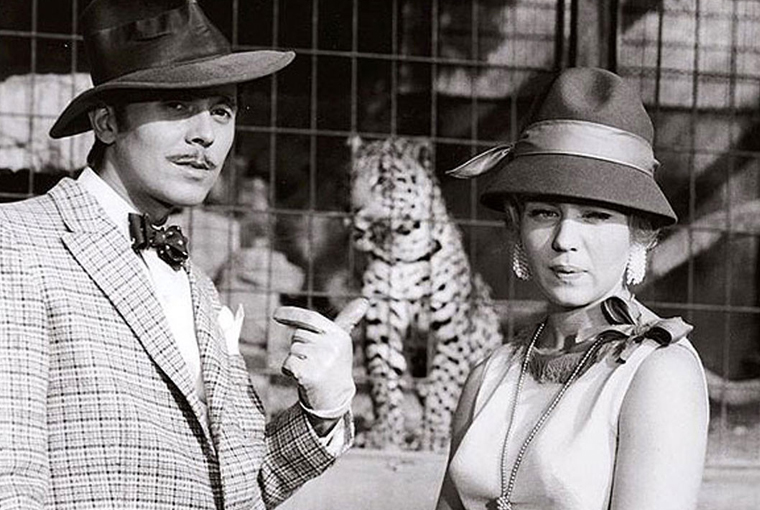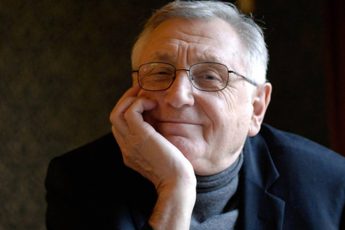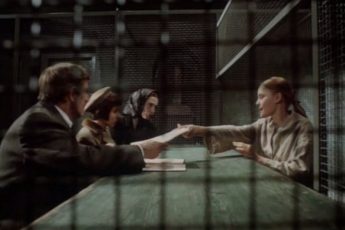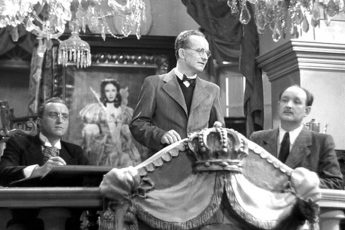Never Too Happy
Oldřich Lipský’s Happy End (Šťastný konec, 1967)
Vol. 130 (December 2022) by Colette de Castro
Imagine time moving backwards. Ships drifting back across the harbor, us getting younger by the day, the planet turning back from disaster like a tramp throwing off his flea-ridden cloak. In the world of the film Happy Ending, made in 1967 by Czechoslovak Oldřich Lipský, we can rejoice because such a scenario is not just possible, but exactly how things work.
The comedy was a much-needed break from the rather bleak program at the Trieste Film Festival this year – bleak films for a bleak Europe. And yet the Italian festival made a beautiful selection of films for their Czech and Slovak retrospective, including the 1960 masterpiece František Vláčil’s White Dove, a poetic feature set on Fehmarn Island in the Baltic Sea, Gustav Machatý’s sexy Eroticon, and Giorgos Skalenakis’ romantic Prague Blues.
Happy Ending deals with a Butcher, a certain Bedřich Frydrych (Vladimír Menšík), whose terrible crime passionnel is made less so by a buoyantly cheerful voice-over that he keeps up, narrating the “birth of his wife” as he opens a large briefcase from which the cut-up parts of her body emerge, blood spilling over the sides – “I had never seen a woman before”. All this chaos is explained by the film’s chronology. It begins with his “birth” (on the day he is executed for his crimes) followed by a childhood spent in a men’s prison, and continues until he is finally given “a pair of lovely silver bracelets” by the police and is led out to discover the world.
The gory apartment in which he finds himself is covered with blood and feathers from a torn duvet. Here, he puts his wife back together again with a tenderness unlike that of any murder scene. Tragically, he is soon led to mourn the “death” of his daughter, but is consoled by the upcoming “birth” of his mother-in-law. As he stands at the church near the latter’s coffin, his voice is heard exclaiming how excited everyone will be to meet her. And so the shenanigans continue. Screenwriter Miloš Macourek, working with the director on the script, did a marvelous job placing lines together that leave the viewer dying to know what comes next, and just as we’re puzzling over the meaning of the last thing we’ve heard, we’re swept up in yet another crazy situation. The English subtitles are very well written, sometimes poetic in their precision, and sometimes downright hilarious.
The actors astound us by acting backwards throughout most of the film. Without missing a beat, they say their lines one after another as time pulls back. Watch for the scene in which two lovers share a plate of blinis. As they look seductively into each other’s eyes, they regurgitate their blinis and place them delicately back onto the plate as the pile becomes higher and higher. It’s both hilarious and repulsive.
Bedřich is as misogynistic as he is murderous. And yet the pleasure he expresses upon learning things about the world make him more endearing than threatening, like the child he is supposed to be. The viewer’s prejudice is cunningly put to the test, as he gets so sick of his wife that he starts dreaming of getting rid of her altogether. Because of the way time works in this story, he’ll have to meet her for the first time before he can say goodbye to her forever, though with a peculiar spin. This happens on his job as a fireman (presumably before he became a butcher, but who really knows at this point) as he carries her up a ladder and thrusts her into a burning building – hilarious dialogue all-included. The last time we see her, we get a glimpse of her desperate face before she disappears into the fire. He climbs back down the ladder, clean and unburdened. He laments that murder was the only way to get rid of this pesky woman who had come to plague his every moment. The story thus implies that murder was inevitable, no matter which way it is skewed. As an allegory of passion in love, Happy End is a cinematic jewel.
In Happy End, there is no time for tragic pondering about love, as we are all only getting younger and more innocent. In another film, the storyline may have been rather predictable, but here it is all new and shiny. I came out of the cinema feeling rather ruffled. It was like being a cat whose hair had been stroked in the wrong direction: a pleasant yet troubling feeling, hope was somewhere in there too. If you can get your hands on a copy of the film, it might just feel like a new beginning. A much-needed feature for the start of 2023.




Leave a Comment